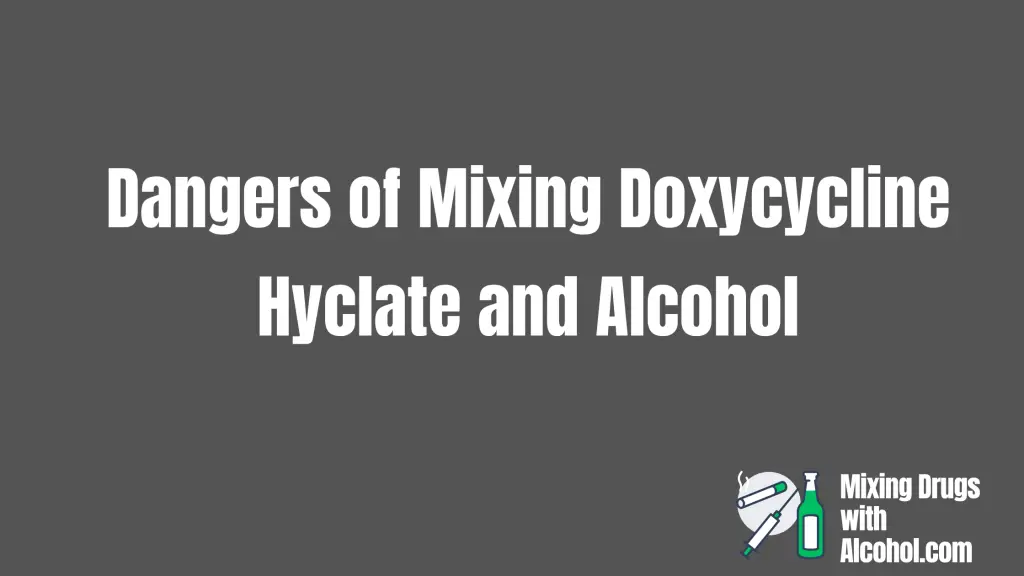Mixing doxycycline hyclate and alcohol can lead to serious health consequences, including increased side effects or even death. Common side effects of doxycycline hyclate include nausea, vomiting, and diarrhea, but more serious reactions can occur when the drug is combined with alcohol, such as liver damage, kidney failure, or death.
It’s important for those prescribed this medication to understand the risks and abstain from drinking alcohol during treatment. Following your doctor’s orders exactly is critical for ensuring safety while consuming doxycycline hyclate.
How Long After Taking Doxycycline Hyclate Can You Drink?
To avoid potentially dangerous side effects, it’s recommended to wait at least 24 hours after taking doxycycline hyclate before drinking alcohol.
Combining these two substances may increase the risk of negative health consequences, including nausea and vomiting. It’s essential to keep in mind that everyone has different tolerances to medications, which may impact the severity of adverse reactions experienced.
Depending on the type of doxycycline hyclate medication, additional precautions may be necessary to ensure safe consumption. Ultimately, it’s best to exercise caution and wait 24 hours before drinking alcohol after taking doxycycline hyclate to reduce the risk of harm and achieve better therapeutic outcomes.
What Is Doxycycline Hyclate?
Doxycycline hyclate is an antibiotic medication used for various infections, with side effects including nausea, vomiting, diarrhea, and liver inflammation.
Mixing doxycycline hyclate with alcohol can cause dangerous symptoms like dizziness, drowsiness, stomach problems, and potential liver damage.
Drinking while taking antibiotics can also increase the chance of getting antibiotic-resistant bacteria. It’s best to avoid mixing any type of medication with alcohol and to consult a healthcare provider before making any decisions.
Side-Effects of Taking Doxycycline Hyclate And Alcohol
Taking doxycycline hyclate, a broad-spectrum antibiotic, with alcohol can cause both short-term and long-term side effects. Some of the most common side effects include:
Short-term side effects:
-
- Nausea and vomiting
-
- Stomach pain and cramps
-
- Diarrhea
-
- Headaches
-
- Dizziness
-
- Blurred vision
-
- Rapid heartbeat
-
- Difficulty breathing
-
- Skin rash
-
- Flushing
Long-term side effects:
-
- Liver damage
-
- Kidney damage
-
- Chronic inflammation of the pancreas
-
- Stomach ulcers and bleeding
-
- Increased risk of esophageal cancer
-
- Central nervous system toxicity
-
- Increased risk of bacterial resistance
-
- Worsening of existing liver or kidney conditions
It’s important to avoid consuming alcohol while taking doxycycline hyclate to avoid these potential side effects. If you do choose to drink, limit yourself to light-to-moderate amounts and consult your doctor first to avoid serious complications.
How To Take Medication Safely
To avoid dangerous side effects and interactions with other medications, it’s important to take medicine safely. Before starting a new medication, understand its purpose, dosage, and possible interactions by consulting with your doctor or pharmacist.
Adhere strictly to the prescribed schedule and never adjust dosages without consulting a healthcare provider. Be sure to always have enough refills on hand to avoid missing doses, which can reduce effectiveness and lead to resistance. With proper care and caution, you can stay safe and healthy during treatment.
Taking Doxycycline Hyclate And Other Drugs
When taking doxycycline hyclate, understanding its interactions with other drugs is crucial to avoid potential risks. Mixing it with alcohol may lead to increased side effects such as nausea and vomiting.
Over-the-counter medicines, supplements, herbal remedies, and certain foods may also interact negatively with doxycycline hyclate.
Before beginning treatment, discuss all OTC medication usage and supplement intake with a doctor to avoid harmful combinations. Informed decisions regarding treatments are key to achieving successful outcomes without unwanted side effects, so it’s essential to evaluate any additional medications or natural remedies being consumed in combination. Consult a qualified medical professional about potential substance interactions to minimize the risk of severe adverse reactions.
Doxycycline and Alcohol Interaction
Doxycycline Hyclate And Caffeine Interaction
Substances like caffeine can interact with medication and affect your health, including doxycycline hyclate, an antibiotic. Caffeine can reduce its absorption, potentially decreasing its effectiveness or causing side effects like dizziness and headaches.
To prevent adverse reactions, individuals should avoid consuming caffeine right before or after taking doxycycline hyclate, and wait at least four hours after a dose to drink anything with caffeine. Talk to a doctor or pharmacist about potential interactions for optimal safety.
Frequently Asked Questions About Danger of Mixing Alcohol And Doxycycline Hyclate:
It is generally not recommended to drink alcohol while taking doxycycline hyclate because it can increase the risk and severity of side effects, such as stomach upset, nausea, vomiting, and headache. Alcohol can also reduce the effectiveness of the medication.
It is recommended to wait at least 24 hours after the last dose of doxycycline hyclate before drinking alcohol. This is to ensure that the medication has cleared from the body
and to avoid any potential interactions.
There is no specific recommended limit for how much alcohol can be consumed with doxycycline hyclate, but it is generally advised to avoid alcohol completely while taking the medication to prevent any potential negative effects. It is important to always follow the advice of a healthcare provider and to read and follow the instructions on the medication label.
- Kuderer, N. M., Dale, D. C., Crawford, J., Cosler, L. E., & Lyman, G. H. (2007). Mortality, morbidity, and cost associated with febrile neutropenia in adult cancer patients. Cancer, 110(10), 2252-2260. https://doi.org/10.1002/cncr.23064
- Kohli, M., & Sandoval, R. (2020). Doxycycline. In StatPearls [Internet]. StatPearls Publishing. https://www.ncbi.nlm.nih.gov/books/NBK526066/
- U.S. National Library of Medicine. (2022). Doxycycline. MedlinePlus. https://medlineplus.gov/druginfo/meds/a682063.html
- U.S. National Library of Medicine. (2022). Alcohol and antibiotics. MedlinePlus. https://medlineplus.gov/ency/article/002286.htm
- Centers for Disease Control and Prevention. (2022). Antibiotic and alcohol interactions. https://www.cdc.gov/alcohol/fact-sheets/antibiotics-and-alcohol.htm
Similar Articles

